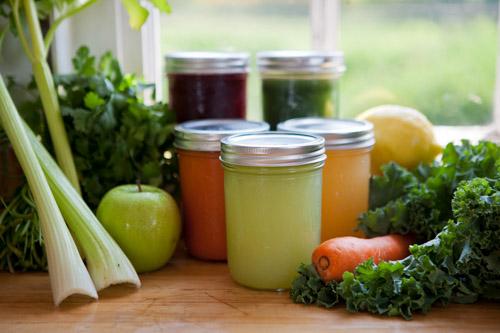
More and more people are starting to do juice cleanses in order to lose weight quickly and detox their bodies. (Courtesy of g-glow.blogspot.com)
Now that spring is fully in session and the weather calls for swimsuits and light clothing, people all over desire to look their best and cleanse their systems. With this comes the push to head to the gym, eat healthy and start juice cleanses.
Juice cleanses have received major attention in the media once celebrities such as Victoria’s Secret model Miranda Kerr and “Gossip Girl” star Blake Lively swore by them. Many of these eminent celebrities claim their Oscar and fashion show ready bodies result from juice cleanses.
A juice cleanse can be anywhere from a two to a ten day program where the user skips regular meals and instead drinks a solution of vegetables and fruits.
More specifically, these juices are unlike common ones found at a grocery store: they are unpasteurized, organic and rid of pathogens.
They substitute the calories of a daily solid food meal and usually contain around 1,000 calories per day. Although sounding extreme, many of these cleanses are actually rich in antioxidants, vitamins and nutritients needed to combat various ailments and toxins in the body.
According to The Huffington Post, the average person does not consume the recommended five to 13 servings of fruits and vegetables the body needs and on average usually only has four servings daily. A juice cleanse ensures feeding this lack of vitamins.
Furthermore, these programs literally “cleanse” and clear the GI tract, improving digestion and the nutritional process. Many companies even claim that the cleanses can help boost energy levels, rid target areas of pain and reduce the chances for future diseases or illnesses.
These cleanses also help jump-start weight loss. According to Cynthia Sass, author of “S.A.S.S. Yourself Slim: Conquer Cravings, Drop Pounds, and Lose Inches,” in an interview with Shape Magazine, juice cleanses can help women “drop pounds” and even though “all of the weight loss may not last, it can be motivating…and [has] inspired some of [her] clients to make lifestyle changes that do lead to long-term success.”
Many of these programs are criticized for just shedding water weight on the user and being deceiving in a weight loss goal. However, the cleanses mentally change the mindset of the user. Because the client is so focused on the various juices being consumed and the lack of normal patterned eating, they become more aware of their unhealthy habits and use the cleanse to alter their mindset.
While juice cleanses are praised for their various nutritional benefits, many doctors are skeptical of the programs.
According to an article about cleanses in The Huffington Post, “juice cleanses can leave out critical nutrients to function.”
“Some of these are fiber and protein, which are generally consumed in meat or tofu. Also, there is no evidence proving that juice cleansing realistically can help lower risk of cancer. These cleanses can sometimes be dangerous: lowering electrolytes and permanently slowing the metabolism,” The Huffington Post said.
In regards to weight loss, juice cleanses are just a short-term action. Many are so focused on the deprivation that juice cleansing can cause backlash and the user can binge eating when finished. Many become fatigued on a juice cleanse and cannot find the energy to exercise, which can be harmful for proper blood flow and for the heart.
Most importantly, a cleanse doesn’t teach long term healthy habits and many end up gaining all of the lost weight back.
Regardless of the pros and cons, juice cleanses are still extremely popular in the health industry and are still growing.
Each program has their own specific recipe that produces different results for the consumer. Popular brands include BluePrint and Roots Pressed Juice Cleanse.
BluePrint is the leading cleanse brand in the industry. Founded in 2000 by Zoe Sakoutis, a highly acclaimed nutritionist, BluePrint was inspired by Sakoutis enduring a debilitating cold.
She was advised to do a cleanse that had promising results, but her experience doing the cleanse was absolutely miserable. She decided to create her own program with her friend Erica Huss. Their program uses tasty raw fruits and vegetables in a juiced form.
They have three different cleanses, the Renovation Cleanse, Foundation Cleanse and Excavation Cleanse. Each one provides specific amenities and is set at various levels according to the experience of the user.
Roots Pressed Juice Cleanse uses 3lbs of fruits and vegetables compacted into their juice set. The cleanses vary from a one to five day cleanse.
Each juice is rich in vitamins and the fruits come from local farms, insuring the organic aspect of them. Roots Pressed Juice claims that their juices comes from a “hydraulic press which minimizes oxidation and releases more vitamins, minerals, and enzymes into each juice” which in the long run helps achieve “increased energy, strengthening of bones, clearer skin and lower risk for disease.”
Juice cleanses are not for everyone and health care professionals encourage people who are interested to consult with a doctor or nutritionist before trying a cleanse. For more information visit http://rootspressedjuices.com and http://blueprintcleanse.com.








